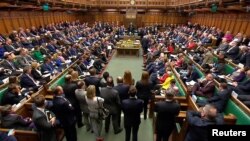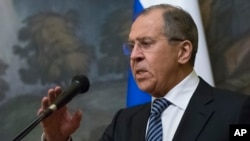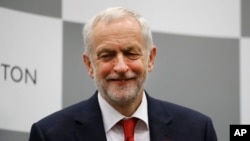Sixty U.S. diplomats expelled by the Kremlin in the escalating dispute over the poisoning of a former Russian spy and his daughter in Britain were seen leaving the U.S. embassy in Moscow Thursday.
Their departure from the Russian capital came as British ministers faced awkward questions about whether they had blundered by over-stating their case blaming Russia for the nerve agent attack that left Sergei Skripal and his daughter, Yulia, in critical condition.
Yulia Skripal's health has been improving, and on Thursday, she said in a statement issued by police that her strength is growing daily. The younger Skripal also said she is grateful for the interest in her and the many messages of goodwill she has received. She also said the entire episode has been "somewhat disorienting" and appealed for privacy during her convalescence.
The British government has been forced to defend its allegations against Russia following a mid-week television interview with a top British defense scientist, who said he and his colleagues at Porton Down, Britain’s defense research laboratory, had not established that the nerve agent in question had been made in Russia.
He did confirm that the toxin was one of the Novichok series of agents that was developed by the former Soviet Union. And he noted that Novichok requires sophisticated handling which is “only in the capabilities of a state actor.” But his admission has been seized on by the Kremlin in the information war it is waging with London.
Speaking at a security conference Thursday in Moscow, Russian Foreign Minister Sergey Lavrov called the the poisoning a “staged pretext for the unprecedented massive expulsion of Russian diplomats” that was intended to “demonize Russia.”
Western countries, with the United States and European Union in the lead, launched a coordinated response against Russia, expelling 145 Russian diplomats last month after accepting British claims that it was “highly likely” that the poisoning of the Skripals one month ago had been approved by the Kremlin.
Next week, the U.S. is expected to announce economic sanctions targeting Russian oligarchs with ties to Russian President Vladimir Putin.
But there has been growing disquiet among some of Britain’s European allies and in the House of Commons at the handling by British ministers of the public relations battle between London and Moscow - especially alarm over comments made by Britain’s foreign secretary, Boris Johnson.
Two weeks ago, Johnson said Porton Down had been “categorical” about the Russian origin of the substance used in the poisoning. Britain’s foreign office also tweeted last month that British scientists had concluded the nerve agent was “produced in Russia.”
Until then, the British case for alleging that the attempted assassination was state-sanctioned rested on arguments of capability, intent and a pattern of highly aggressive Kremlin behavior — from the 2014 annexation of Crimea to cyber attacks on Western states, as well as the multiple deaths of Russian dissidents, Putin critics and former spies on British soil.
British opposition Labor leader Jeremy Corbyn has accused Johnson of “completely exceeding the information he had been given.” Corbyn added, “He claimed categorically, and I think he used the words '101 percent,' that it had come from Russia … Either the foreign secretary has information that he’s not sharing with Porton Down or it was a bit of exaggeration. I don’t know which it is, but I think we need a responsible, cool approach.”
Johnson has responded, saying, “Twenty-eight other countries have been so convinced by [the] UK case that they have expelled Russians. In contrast, Jeremy Corbyn chooses to side with the Russian spin machine.”
The British government’s lack of consistency in the information war with Russia has earned also disapproval beyond the ranks of opposition lawmakers.
The Times of London said Thursday the case against Russia “has been undermined this week by a series of blunders” by the British government, which, the newspaper said, has handed a PR opportunity to Russian President Vladimir Putin and his top officials to obfuscate (render obscure).
Its top columnist, David Aaronovitch, said, “What we have is a degree of clumsiness” by British ministers, horribly timed to detract from the British diplomatic victory Wednesday at the Organization for the Prohibition of Chemical Weapons. Russia pushed for an OPCW investigation into the British claims with Russian scientists involved. The British opposed Russian participation and won the vote.
Commentator Steve Richards worries that Britain has fallen into Russian traps. He argues, “There should be a calmer sequence to these events.” That Britain has rushed the dispute. Others complain that if, as British ministers claim, President Putin ordered the poisoning hoping to shape a diplomatic dispute with the West to boost his re-election vote, then why didn’t the British government wait until after last month’s election before formally blaming the Kremlin for the nerve agent attack.
Britain’s security minister, Ben Wallace, said Thursday the Porton Down scientists had only provided one part of the picture and had never been expected to attribute responsibility for the attack.
He told the BBC, “Scientists are scientists. I, as well as national security, have organized crime [and] terrorism under my portfolio, and when we work with forensic scientists, the scientists tell us what something is. They tell me a gun and a type of gun was used, but the attribution of who used it, exactly how it was used, is a matter for the broader investigation.”
Wallace said that includes intelligence assessments.






